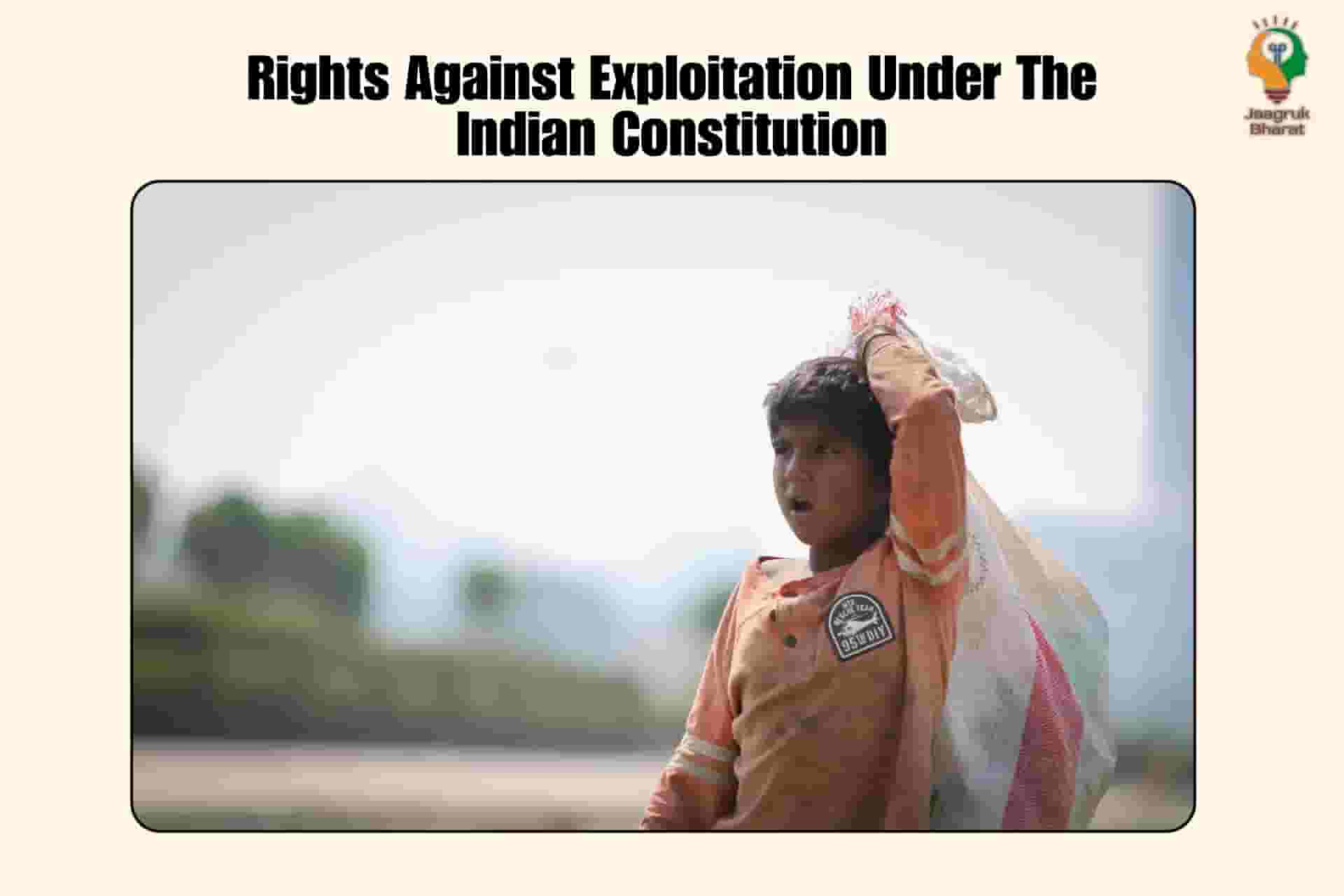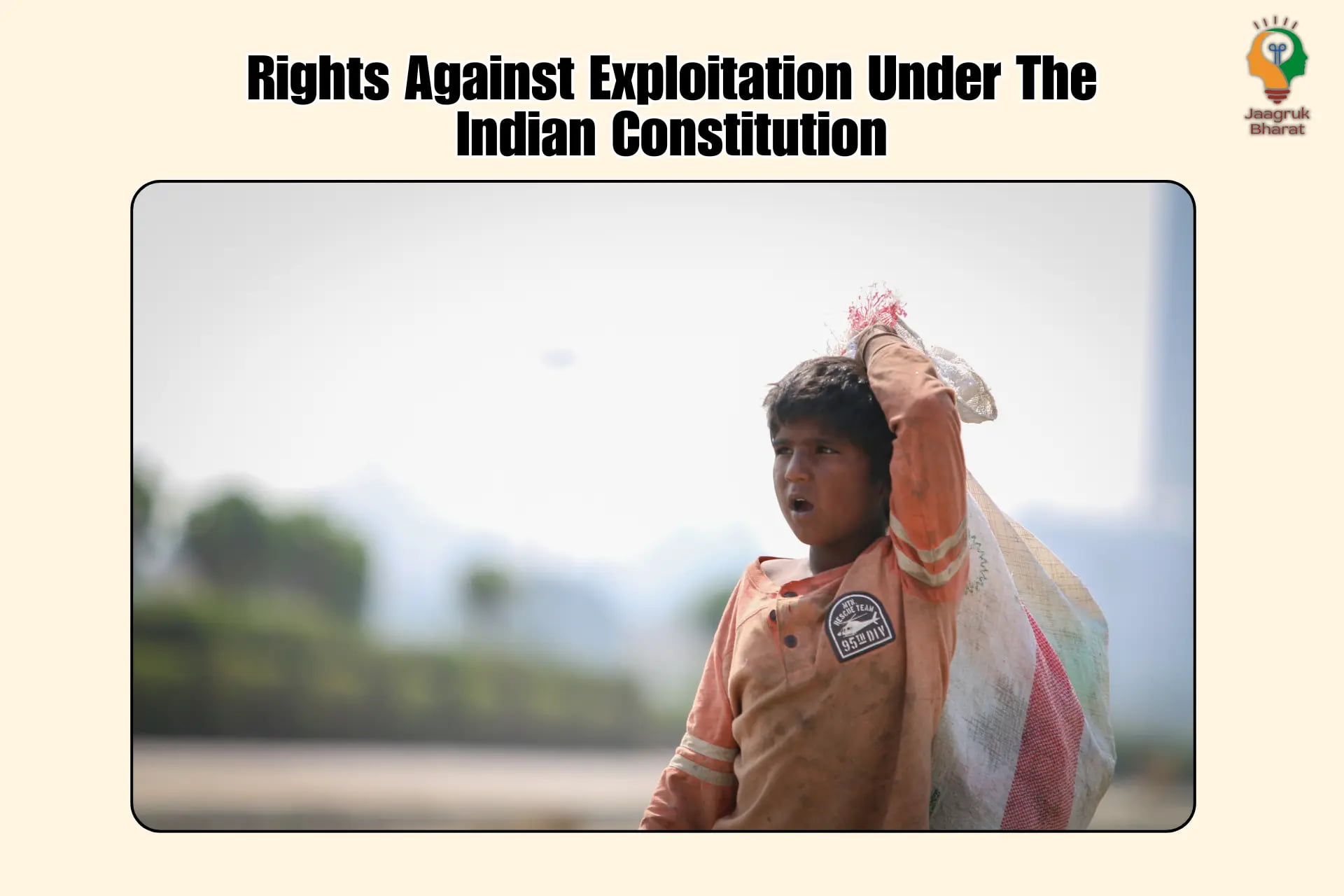Rights Against Exploitation Under The Indian Constitution | Article 23 and 24
Updated: 12-10-2025 at 6:49 PM
1k


Exploitation of an individual for work, also known as forced labour or ‘begar’ was abolished by the Constitution of India upon its enactment in 1950. This way, individuals who were being paid less for work, engaged in inhumane working conditions forcibly, children engaged in labour and many more are protected by the constitution.
Articles 23 and 24 of the Constitution of India envisages the rights against exploitation. The articles regulate multiple forms of forced labour or exploitation that may take place. Let us learn in detail about these Articles.
Read More: What Things You Must Know About The Employment Laws In India?
What Is Article 23 Of The Constitution Of India?
Article 23 of the Indian Constitution deals specifically with the trafficking of human beings and making them do forced labour. Article 23 reads:
“Traffic in human beings and beggar and other similar forms of forced labour are prohibited and any contravention of this provision shall be an offence punishable in accordance with law.
Nothing in this article shall prevent the State from imposing compulsory service for public purpose, and in imposing such service the State shall not make any discrimination on grounds only of religion, race, caste or class or any of them.”
It imposes a positive obligation on the governments at different levels to prevent trafficking and help in the rehabilitation of the exploited. It also directs the government to frame laws regulating forced labour.
Also Read, “World Day Against Child Labour”.
What Are The Details Of Article 23 Of The Constitution?
Article 23 of the Indian Constitution is very necessary to prevent trafficking and exploitation by forcing people to work. Some of its details have been enlisted below:
-
The right is available to citizens of India as well as to non-citizens.
-
It protects individuals against the State as well as private citizens.
-
It imposes a positive obligation on the State to abolish immoral practices of exploitation like human trafficking and other forms of forced labour.
-
Article 23 expressly prohibits the following practices:
-
Beggar
-
Traffic in Human Beings
-
Forced Labour
-
In the case of People’s Union for Democratic Rights v. Union of India (1983) the Supreme Court interpreted the ambit of Article 23 of COI. The scope of Article 23 is vast and unlimited. The word force has a very wide meaning under Article 23. It not only includes physical or legal force but also recognises economic circumstances which compel a person to work against his will on less than minimum wage.
It was directed by the court to the Government to take necessary steps for punishing the violation of the fundamental rights of the citizens guaranteed under Article 23 by private individuals.
Read More: The Unorganised Workers’ Social Security Act, 2008: Protecting The Builders Of The Country
What Is Article 24 Of The Indian Constitution?
Article 24 of the Constitution of India was inserted to deal with the issue of child labour. It prohibits engaging any child below the age of 14 years in labour or any workplace. Article 24 reads:
“No child below the age of fourteen years shall be employed to work in any factory or mine or engaged in any other hazardous employment.”
Many different laws such as the Child Labour Prohibition and Regulation Act, 1986 have been framed to deal with the issue of child labour.
What Are The Details Of Article 24 Of The Indian Constitution?
Article 24 is a child welfare provision in the constitution which imposes a moral obligation on the citizens to not employ and the state to prohibit, prevent and regulate child labour. This article sometimes works simultaneously with Article 23 in case children have been trafficked and forcibly engaged in some activity.
In the case of M.C Mehta v. State of Tamil Nadu (1997), the Supreme Court held that children below the age of fourteen years cannot be employed in any hazardous industry, mines or other works.
Also Read: “Ujjawala Scheme: Helping Victims Of Trafficking”.
How To Get A Remedy For Breach Of Articles 23 And 24?
If you want to report a breach of right done by any State Authority due to any reason, you can visit your lawyer and discuss it with them. You can ordinarily file a Writ Petition under Article 226 of the Constitution of India in the High Court to claim remedies and hold the authorities accountable.
You can also sue private entities such as companies, organisations or private individuals under the available statutory remedies.
However, you must seek expert opinion and consult your lawyer.
Read More: Understanding The Contract Labour (Regulation & Abolition) Act, 1970
Conclusion
We must always be mindful of our surroundings and report any activity that may be in contravention of rights against exploitation and other fundamental rights. In case you find something suspicious, report it to the authorities as only then will we be able to give India a better shape socially.
For more information regarding these provisions, you can access the Constitution of India in different languages.
To know more about such documents and information, stay connected to Jaagruk Bharat. You can also share your thoughts or ask questions with us by reaching our community page.
Frequently Asked Questions
0
0
1k
0
0
1k Views
0
No comments available





Our Company
Home
About
T&C
Privacy Policy
Eula
Disclaimer Policy
Code of Ethics
Contact Us
Careers
Cancellation & Refund Policy
Categories
Women
Insurance
Finance
Tax
Travel
Transport & Infrastructure
Food
Entertainment
Communication
Government ID Cards
E-commerce
Traffic guidelines
Miscellaneous
Housing and Sanitation
Sports
Startup
Environment and Safety
Education
Agriculture
Social cause
Employment
Disclaimer: Jaagruk Bharat is a private organization offering support for documentation and government scheme access. We are not affiliated with any government body. Official services are available on respective government portals. Our goal is to make processes easier and more accessible for citizens.
All Copyrights are reserved by Jaagruk Bharat